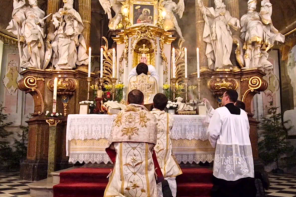On January 21, Pope Benedict XVI lifted the excommunication of four bishops, members of the Society of St. Pius X who broke with Rome over their protests that the teachings of the Second Vatican Council were too progressive. The bishops were excommunicated over twenty years ago after they were consecrated by the late Archbishop Marcel Lefebrve without papal permission.
The Congregation of Bishops published a decree following the Pope’s remission of the excommunication. It read:
His Holiness Benedict XVI – in his paternal compassion for the spiritual discomfort expressed by the parties concerned, because of the excommunication, and trusting in the commitment they expressed in the aforesaid letter to spare no efforts in examining outstanding questions through the requisite discussions with the authorities of the Holy See in order to reach a prompt, full and satisfactory solution to the original problem – has decided to reconsider the canonical position of Bishops Bernard Fellay, Bernard Tissier de Mallerais, Richard Williamson and Alfonso de Galarreta, which arose following their episcopal consecration.
It is not surprising that the pope wanted to bring these four back into the fold. The pope has been courting the bishops since the beginning of his papacy. He even limited the restrictions on the Latin Mass in order to win back traditionalist Catholics like those affiliated with the Society of St. Pius X.
However, while it may have been advantageous for the Church hierarchy, many groups are disappointed by the pope’s decision. Not only do these bishops maintain an extremely conservative ideology, but the group has long-held animosity towards Judaism. Beginning with a 1985 letter to Pope John Paul II in which Lefebrve identified Catholicism’s contemporary enemies as “Jews, Communists, and Freemasons.”
More recently, Bishop Richard Williamson—one of the four who has been un-excommunicated—has denied the Holocaust. In an interview with a Swedish television station, Williamson stated, “The historical evidence is hugely against six million Jews having been deliberately gassed in gas chambers as a deliberate policy by Adolf Hitler.”
Apparently, the pope’s decision came as a surprise to members of the highest parts of the hierarchy. Even Cardinal Walter Kasper, the director of the Pontifical Council for Promoting Christian Unity and the liaison for Vatican-Jewish relations, was not consulted.
Jewish communities, along with progressive Catholics, are mourning the pope’s decision. Riccardo di Segni, the chief rabbi of Rome stated, “It’s a very serious situation.”
The pope had a visit scheduled to Israel for this year but it looks as if it will be cancelled. There was much controversy around the visit in relation to the Holocaust as Catholic officials demanded that a photograph caption at the Yad Vashem Holocaust memorial be removed as it criticizes Pope Pius XII’s conduct during World War II. Many maintain that Pius XII was not quick enough to denounce the Holocaust, while others believe that Pius XII should be made a saint. The Vatican has not yet publically stated whether or not they will advance the cause for Pius XII’s beatification.
After this move, it is probably safe to say that the violence in Gaza will not be the only reason that the pope may cancel his trip. His actions are indeed causing a huge setback in Jewish-Catholic relations.




